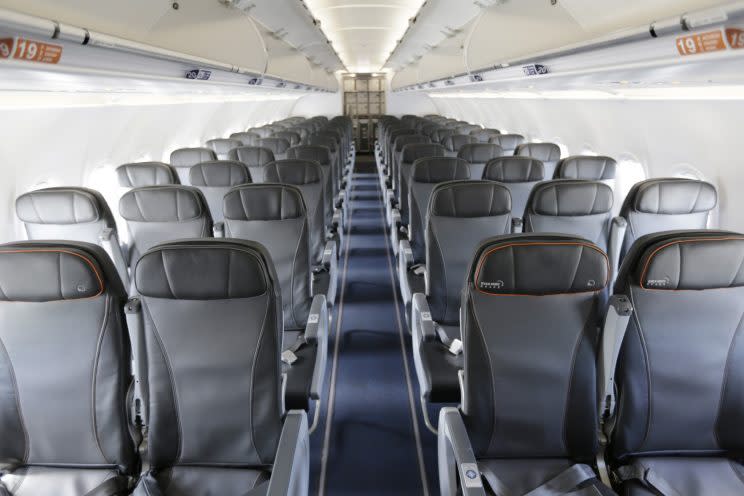Southwest to stop overbooking flights. Will other airlines follow?
Overbooked flights are a regular occurrence in the airline industry, but one major carrier has announced it is bucking the trend.
Southwest (LUV) CEO Gary Kelly said in an interview with CNBC that the airline will soon put an end to overbooking flights.
“I’ve made the decision, the company made the decision, that we will cease to overbook going forward,” he said.
The news comes just weeks after passenger Dr. David Dao was involuntarily bumped from a United flight, and violently removed from the plane after refusing to give up his seat on the overbooked flight. Dao received a concussion, broken nose and two broken teeth, his lawyer says. He is now suing United Airlines (UAL).

While the United incident has caused many airlines to rethink their overbooking policies, Kelly says it’s not what inspired his decision.
“I bet we don’t overbook a flight more than say one seat,” he said. “We’ve been taking steps over the last several years to prepare ourselves for this anyway.”
In an email to Yahoo Finance, a Southwest spokesperson confirmed that the airline will no longer book a flight over capacity as part of the selling process.
“As we have dramatically improved our forecasting tools and techniques, and as we approach the upcoming implementation of our new reservations system on May 9, we no longer have a need to overbook as part of the revenue management inventory process,” said the airline.
But that doesn’t mean that flights will never be at overcapacity at the time of departure. The spokesperson clarified that occasional “operational challenges” may require the airline to ask volunteers to give up their seat. Still, this will happen less frequently because overbooking will be discontinued.
Airlines regularly overbook flights because some passengers simply don’t show up. By overbooking, airlines are able to reduce the number of empty seats and keep fares low.
Will other airlines follow?
So far Southwest is the only airline that has promised to stop overbooking, but several airlines have updated their policies on the issue.

On Thursday, United unveiled new rules for overbooking passengers. Effective immediately, United customers can receive compensation up to $10,000 for involuntarily denied boarding. This change is one of 10 new rules designed to improve the customer experience, and repair United’s damaged public image.
“Two weeks ago, we failed to meet that standard and we profoundly apologize,” said United CEO Oscar Munoz. “Today, we are taking concrete, meaningful action to make things right and ensure nothing like this ever happens again.”
In addition to the $10,000 cap, the airline also commits to:
Not require customers seated on the plane to give up their seat involuntarily unless safety or security is at risk
Reduce the amount of overbooking
Limit the use of law enforcement to safety and security issues only
Ensure crews are booked onto a flight at least 60 minutes prior to departure
Provide employees with additional annual training
Create an automated system for soliciting volunteers to change travel plans
Empower employees to resolve customer service issues in the moment
Establish a customer solutions team to provide agents with creative solutions to get customers to their destinations.
Eliminate red tape on permanently lost bags by adopting a “no questions asked policy” on lost luggage.
Whether United’s actions will improve its damaged reputation is yet to be seen, but other airlines have also adjusted their passenger and overbooking policies to prevent a similar public affairs nightmare.
On April 14, Delta (DAL) announced that it would offer customers up to nearly $10,000 in compensation to give up their seat if a flight was overbooked. Previously, gate agents were only allowed to offer passengers up to $800; now that number is $2,000. If the airline still doesn’t get volunteers, supervisors can offer up to $9,950 in compensation. This is up from the previous max of $1,350. Even with the changes, the maximum payout will probably be tough for passengers to actually get. The airline’s contract of carriage very clearly states that the amount of compensation is “subject to Delta’s sole discretion.”
American Airlines (AAL) also made changes on April 14, updating its Conditions of Carriage to state that it will not remove a passenger (who’s paid for their ticket), who has already boarded, in order to give a seat to another passenger – without them volunteering to do so.
American would not disclose how much compensation bumped travelers will get, but an AP analysis of government data from 2015 and 2016 revealed that American Airlines paid an average of $554 in compensation for passengers who were denied a seat.
The same analysis showed that Delta paid $1,118, Southwest paid $758, and United paid $565.
Brittany is a reporter at Yahoo Finance.
Whose frequent-flier program offers the best value?
Here’s how Amex Platinum’s new perks compare to Chase Sapphire Reserve

